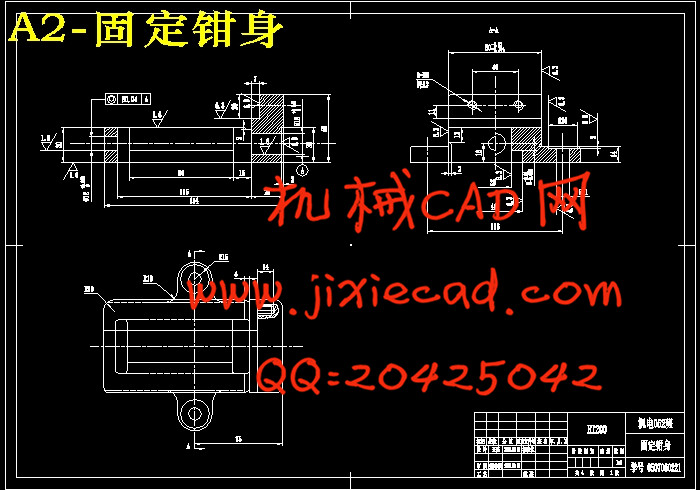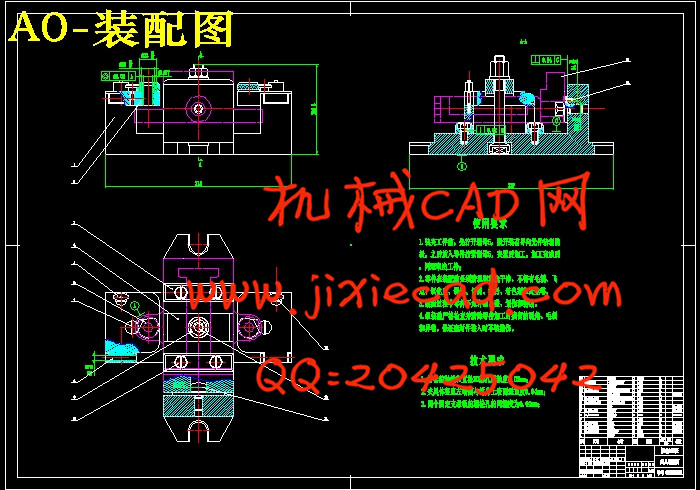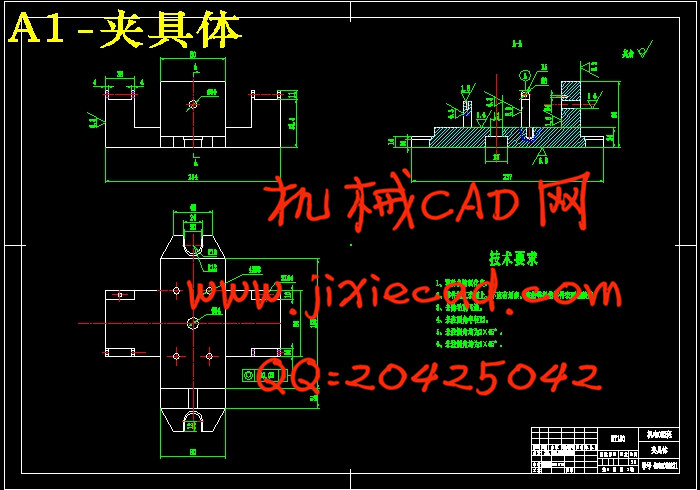设计简介
摘 要
我们这次课程设计的主题是工件夹具设计,我的设计题目是:虎钳固定钳身零件的机械加工工艺规程编制及钻削 2-11孔工序专用夹具。主要内容有:画零件图;加工工艺规程的设计;夹具体的设计以及零件、装配图的绘制。
2-11孔工序专用夹具。主要内容有:画零件图;加工工艺规程的设计;夹具体的设计以及零件、装配图的绘制。
这次机械制造课程设计的意义有以下几点体会:
首先,通过这次课程设计,让我们重新的温习的机械制造、工程图学以及互换性知识。我们在设计过程中,结合实际工件的情况查找相关资料,不仅仅是对书本知识的巩固,更是通过思考后对知识的理解。而我个人感觉最重要的是知道了一些知识的产生来源,怎样通过原理推广到实际的应用当中。例如,六点定位原理的实际应用,怎样通过这个原理选择合适的定位,选择正确的定位元件,这些都是结合原理应用到实际问题。
其次,通过这次课程设计也锻炼了我们的独立思考能力和个人解决实际问题的能力。同时几个人在一组设计,也让我们懂得了讨论和交流的重要性。独立思考与适当交流两者结合起来,对我们是一种锻炼。几个人同一组有同样的加工工序,但每个人都有自己的加工工步,既促进了交流,避免闭门造车,又在一定程度上训练了我们的独立思考能力。
最后,我们此次作图使用了作图软件,例如CAXA,AUTOCAD,PRO/E。因为我们此次设计画图任务很重,在作图过程熟悉了这几种软件中的一种。在闲暇之时,我们还交流作图经验,为以后走上工作岗位打好基础。作为一个学机械的学生应该有熟练的作图水平。
Abstract
We designed this course is the theme of the workpiece fixture design, my design is entitled: Huqian fixed clamp body parts of the machining process planning and preparation process for drilling holes 2-11 fixture. Elements include: painting parts map; processing of order design; folder specific design and components, the assembly of the plan is drawn.
The machinery manufacturing curriculum design is the significance of the following experience:
First of all, through the curriculum design, let us re-study the machinery manufacturing, engineering graphics and interchangeability of knowledge. We in the design process, in light of the realities of the workpiece to find relevant information, not just the book knowledge of consolidation, after thinking through the knowledge and understanding. I personally feel the most important thing is that a number of sources have knowledge of how to promote the principles to the actual application of them. For example, 6:00 targeting the practical application of principles of how this principle to choose a suitable location, choose the correct positioning devices, these principles are applied to the combination of practical problems.
Secondly, through this training course design also our ability to think independently and individuals the ability to solve practical problems. At the same time a group of a few people in the design, let us also understand the importance of the discussion and exchange. Independent thinking and appropriate exchange with the two of us is a kind of exercise. The same group of a few people have the same processing, but everyone has their own processing the step, not only promote the exchanges and avoid working behind closed doors, to a certain extent, the training of our independent thinking.
Finally, we use the mapping of the mapping software, for example, CAXA, AUTOCAD, PRO / E. Because we have the design drawing heavy tasks in the process of drawing familiar with this in one of several software. In her spare time, we also exchange experience in drawing, for the future work on laying a solid foundation. As a mechanical school students should have the skilled drawing level.
目 录
1.固定钳身的工艺分析 1
1.1固定钳身的用途 1
1.2固定钳身的技术要求 2
1.3审查零件的工艺性 3
1.4确定固定钳身的生产类型 3
2.加工工艺规程 3
2.1选择毛坯 3
2.2确定毛坯的尺寸公差与机械加工余量 3
2.3拟定工艺路线 4
2.3.1定位基准的选择 4
2.3.2表面加工方法的确定 5
2.3.3加工阶段的划分 5
2.3.4工序的集中和分散 5
2.3.5机械加工工序 6
2.3.6确定工艺路线 6
2.4加工余量、工序尺寸和公差的确定 6
2.5切削用量的计算 7
2.5.1钻孔工步 7
2.5.2粗铰工步 8
2.5.3精铰工步 8
3.专用夹具设计 8
3.1夹具设计任务 8
3.2确定夹具的结构方案 8
3.2.1确定定位元件 8
3.2.2确定导向装置 9
3.2.3确定夹紧装置 9
4.参考文献 10
我们这次课程设计的主题是工件夹具设计,我的设计题目是:虎钳固定钳身零件的机械加工工艺规程编制及钻削
这次机械制造课程设计的意义有以下几点体会:
首先,通过这次课程设计,让我们重新的温习的机械制造、工程图学以及互换性知识。我们在设计过程中,结合实际工件的情况查找相关资料,不仅仅是对书本知识的巩固,更是通过思考后对知识的理解。而我个人感觉最重要的是知道了一些知识的产生来源,怎样通过原理推广到实际的应用当中。例如,六点定位原理的实际应用,怎样通过这个原理选择合适的定位,选择正确的定位元件,这些都是结合原理应用到实际问题。
其次,通过这次课程设计也锻炼了我们的独立思考能力和个人解决实际问题的能力。同时几个人在一组设计,也让我们懂得了讨论和交流的重要性。独立思考与适当交流两者结合起来,对我们是一种锻炼。几个人同一组有同样的加工工序,但每个人都有自己的加工工步,既促进了交流,避免闭门造车,又在一定程度上训练了我们的独立思考能力。
最后,我们此次作图使用了作图软件,例如CAXA,AUTOCAD,PRO/E。因为我们此次设计画图任务很重,在作图过程熟悉了这几种软件中的一种。在闲暇之时,我们还交流作图经验,为以后走上工作岗位打好基础。作为一个学机械的学生应该有熟练的作图水平。
Abstract
We designed this course is the theme of the workpiece fixture design, my design is entitled: Huqian fixed clamp body parts of the machining process planning and preparation process for drilling holes 2-11 fixture. Elements include: painting parts map; processing of order design; folder specific design and components, the assembly of the plan is drawn.
The machinery manufacturing curriculum design is the significance of the following experience:
First of all, through the curriculum design, let us re-study the machinery manufacturing, engineering graphics and interchangeability of knowledge. We in the design process, in light of the realities of the workpiece to find relevant information, not just the book knowledge of consolidation, after thinking through the knowledge and understanding. I personally feel the most important thing is that a number of sources have knowledge of how to promote the principles to the actual application of them. For example, 6:00 targeting the practical application of principles of how this principle to choose a suitable location, choose the correct positioning devices, these principles are applied to the combination of practical problems.
Secondly, through this training course design also our ability to think independently and individuals the ability to solve practical problems. At the same time a group of a few people in the design, let us also understand the importance of the discussion and exchange. Independent thinking and appropriate exchange with the two of us is a kind of exercise. The same group of a few people have the same processing, but everyone has their own processing the step, not only promote the exchanges and avoid working behind closed doors, to a certain extent, the training of our independent thinking.
Finally, we use the mapping of the mapping software, for example, CAXA, AUTOCAD, PRO / E. Because we have the design drawing heavy tasks in the process of drawing familiar with this in one of several software. In her spare time, we also exchange experience in drawing, for the future work on laying a solid foundation. As a mechanical school students should have the skilled drawing level.
目 录
1.固定钳身的工艺分析 1
1.1固定钳身的用途 1
1.2固定钳身的技术要求 2
1.3审查零件的工艺性 3
1.4确定固定钳身的生产类型 3
2.加工工艺规程 3
2.1选择毛坯 3
2.2确定毛坯的尺寸公差与机械加工余量 3
2.3拟定工艺路线 4
2.3.1定位基准的选择 4
2.3.2表面加工方法的确定 5
2.3.3加工阶段的划分 5
2.3.4工序的集中和分散 5
2.3.5机械加工工序 6
2.3.6确定工艺路线 6
2.4加工余量、工序尺寸和公差的确定 6
2.5切削用量的计算 7
2.5.1钻孔工步 7
2.5.2粗铰工步 8
2.5.3精铰工步 8
3.专用夹具设计 8
3.1夹具设计任务 8
3.2确定夹具的结构方案 8
3.2.1确定定位元件 8
3.2.2确定导向装置 9
3.2.3确定夹紧装置 9
4.参考文献 10






